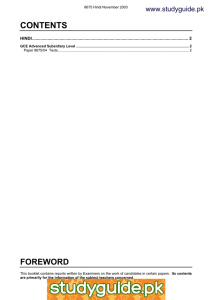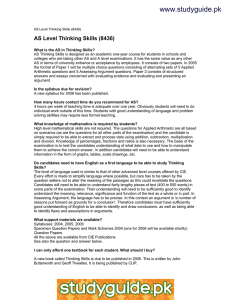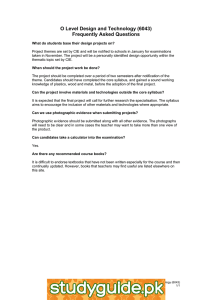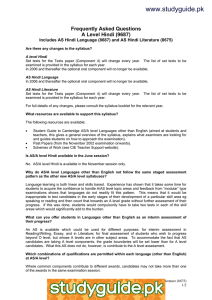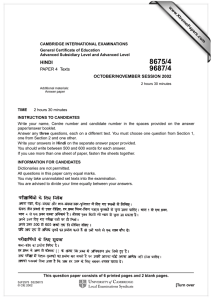www.studyguide.pk A Level Hindi (9687)
advertisement
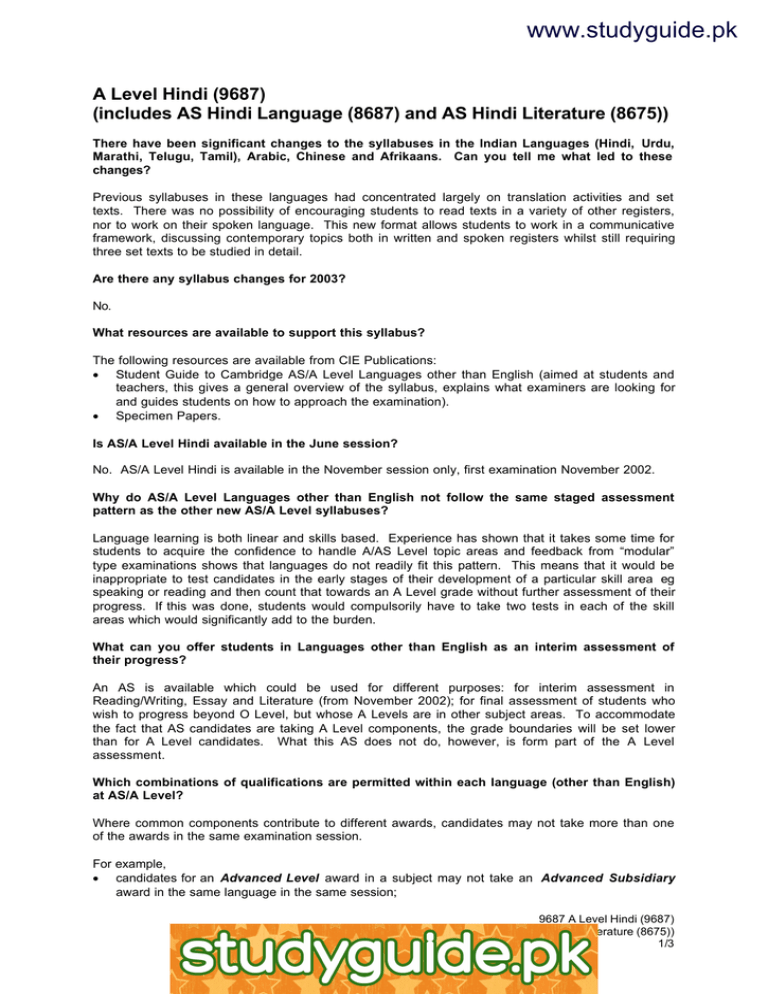
www.studyguide.pk A Level Hindi (9687) (includes AS Hindi Language (8687) and AS Hindi Literature (8675)) There have been significant changes to the syllabuses in the Indian Languages (Hindi, Urdu, Marathi, Telugu, Tamil), Arabic, Chinese and Afrikaans. Can you tell me what led to these changes? Previous syllabuses in these languages had concentrated largely on translation activities and set texts. There was no possibility of encouraging students to read texts in a variety of other registers, nor to work on their spoken language. This new format allows students to work in a communicative framework, discussing contemporary topics both in written and spoken registers whilst still requiring three set texts to be studied in detail. Are there any syllabus changes for 2003? No. What resources are available to support this syllabus? The following resources are available from CIE Publications: • Student Guide to Cambridge AS/A Level Languages other than English (aimed at students and teachers, this gives a general overview of the syllabus, explains what examiners are looking for and guides students on how to approach the examination). • Specimen Papers. Is AS/A Level Hindi available in the June session? No. AS/A Level Hindi is available in the November session only, first examination November 2002. Why do AS/A Level Languages other than English not follow the same staged assessment pattern as the other new AS/A Level syllabuses? Language learning is both linear and skills based. Experience has shown that it takes some time for students to acquire the confidence to handle A/AS Level topic areas and feedback from “modular” type examinations shows that languages do not readily fit this pattern. This means that it would be inappropriate to test candidates in the early stages of their development of a particular skill area eg speaking or reading and then count that towards an A Level grade without further assessment of their progress. If this was done, students would compulsorily have to take two tests in each of the skill areas which would significantly add to the burden. What can you offer students in Languages other than English as an interim assessment of their progress? An AS is available which could be used for different purposes: for interim assessment in Reading/Writing, Essay and Literature (from November 2002); for final assessment of students who wish to progress beyond O Level, but whose A Levels are in other subject areas. To accommodate the fact that AS candidates are taking A Level components, the grade boundaries will be set lower than for A Level candidates. What this AS does not do, however, is form part of the A Level assessment. Which combinations of qualifications are permitted within each language (other than English) at AS/A Level? Where common components contribute to different awards, candidates may not take more than one of the awards in the same examination session. For example, • candidates for an Advanced Level award in a subject may not take an Advanced Subsidiary award in the same language in the same session; 9687 A Level Hindi (9687) (includes AS Hindi Language (8687) and AS Hindi Literature (8675)) 1/3 http://www.xtremepapers.net www.studyguide.pk However, candidates may take Advanced Subsidiary Language and Advanced Subsidiary Literature in the same language in the same session. Are students allowed to take dictionaries into the examination room? No. Dictionaries are not permitted. If my candidate is ungraded at A Level, is there a possibility of a compensatory AS? Yes, all candidates in this position will then be regraded as AS candidates using the components which are common to both Levels and will be awarded an AS grade. Can I teach AS and A Level candidates in the same classroom? Yes, the overlap between the components for AS and A Level is such that most activities will be suitable for both groups. I've got a great idea for a set text I’d like to see on the syllabus, and I think it would be very popular with other teachers too. What should I do? Please write to the Product Manager for A Level Hindi. We welcome suggestions from our Centres for set texts in future sessions. Can students take their set texts into the examination for Paper 4? Yes, unannotated set texts may be taken into the examination room for Paper 4. What are the rules about candidates annotating their set texts for Paper 4? The copies of the set texts candidates take into the examination room must not have been written on or marked in any way. Is it a requirement to use particular editions of the set texts? Is it a problem if my candidates are studying from different editions? If a particular edition is not specified in the syllabus booklet, students can use any edition (so long as it is the full text). Are candidates who prepare more than the minimum required set texts at an advantage in the exam room? Only in the sense that they potentially will have more choice of questions. In reality, demands on classroom time mean that it is unlikely that many candidates will have prepared more than 3 texts. What do you think of the educational benefits of doing the AS Literature with students of O Level age? Good idea – we have had feedback from a number of Centres who feel that this is something which could be used for O Level First or very fluent Foreign Language students to give curriculum and cultural enrichment. What is the point of doing the optional Speaking test? Where the language is taught in a classroom situation, this will enable candidates to derive enjoyment and benefit from the course in a skills area which has hitherto been somewhat neglected in the assessment. The endorsement appears on the certificate, although it does not contribute to the overall grade, and can be used for higher education and employment purposes. 9687 A Level Hindi (9687) (includes AS Hindi Language (8687) and AS Hindi Literature (8675)) 2/3 www.studyguide.pk When will I receive the materials for the AS/A Level optional Speaking test? No question paper is required. The materials for the conduct and assessment of the Speaking test are to be found in the syllabus booklet for the appropriate year. Centres must provide their own cassette on which to record the sample of candidates for moderation. CIE will provide Centres with the MS1 computer-printed mark sheet(s) in October for the November session and marks can then be transferred from the working mark sheet(s). What is the period for conducting the AS/A Level optional Speaking tests? The Speaking test period is as follows: November session: 15 October-15 November. For AS/A Level optional Speaking tests, what is the deadline for submitting cassettes, working mark sheets and MS1 mark sheets to CIE for moderation? Mark sheets and cassettes for moderation for the AS/A Level optional Speaking tests must arrive at CIE no later than: 30 November for the November session. Once your Centre has completed its tests, you should despatch mark sheets and cassettes for moderation as soon as possible. Please don't wait until the end of the examination period before sending us these items. Must I be accredited by CIE before conducting and assessing the AS/A Level Languages other than English optional Speaking test? Accreditation from CIE is not required in order to conduct the AS/A Level Languages other than English optional Speaking test Who marks the Speaking tests? It is the responsibility of the person conducting the Speaking tests to mark them. The tests should be marked as they are being conducted. Examiners should mark the 'live' candidate and not a recording. How should I go about choosing someone to conduct and assess the Speaking tests at my Centre? Ideally, a teacher at the school should conduct and assess the Speaking tests. Where this is not possible and it is necessary to look for someone outside the school, you should look for someone who is fluent in the language, preferably with teaching experience and with experience of conducting other oral examinations. It is important that the person appointed takes the time to familiarise him/herself with the requirements of the examination before conducting and assessing any 'live' Speaking tests. The examination syllabus contains all the information the examiner will need and should be sent to him/her to read before the day of the examination. If it is not possible to send the syllabus to the examiner beforehand, then, on the day of the examination, you should arrange for him/her to arrive at the Centre 1-2 hours before conducting and assessing the first Speaking test, in order that s/he can read through the instructions contained in the syllabus. What happens to my (Centre's) Speaking marks when they arrive at CIE? When your recorded sample, working mark sheet(s) and moderator copy of the MS1 mark sheet(s) arrive at CIE, they are forwarded to one of our Moderators. The Moderator listens to your sample and looks at the marks that you have awarded to ensure that they are in line with the international standard. If your marks are in line, then they will not be changed. If they are not, then an adjustment will be made to bring them into line, eg the marks will be raised if you have marked your candidates severely, or lowered if you have been too generous. A report on your conduct and assessment of the Speaking tests will be sent to your Centre with the results. 9687 A Level Hindi (9687) (includes AS Hindi Language (8687) and AS Hindi Literature (8675)) 3/3
